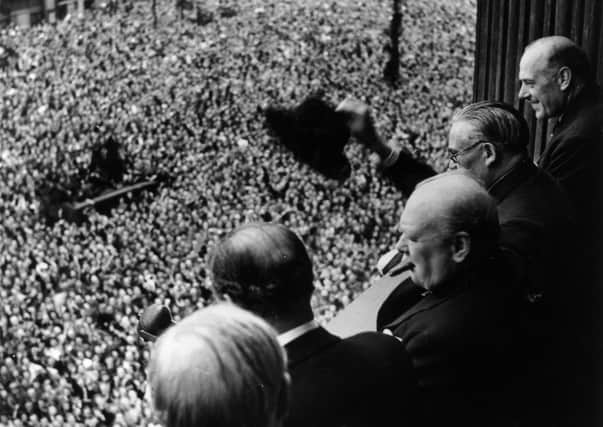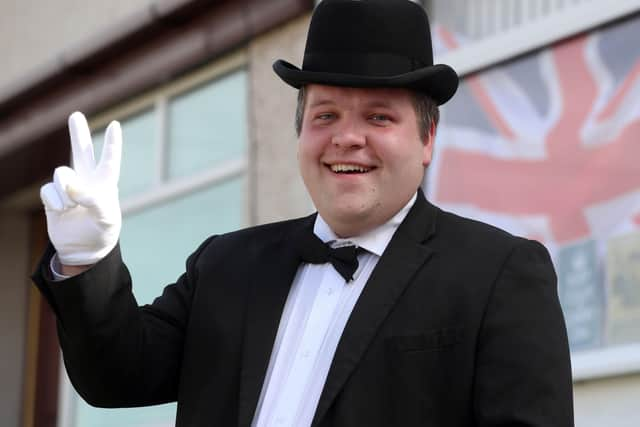VE Day in Belfast: For the first time in six years the skies glowed with the light from bonfires ...


On VE Day thousands of people gathered outside Belfast City Hall in scenes reminiscent of the signing of the Ulster Covenant in September 1912 and end of the First World War in November 1918. In the evening the city hall was floodlit for the first time since September 1939.
Sir Crawford McCullagh, the lord mayor of Belfast, said: ‘We have much to be thankful for, and let us in our rejoicing remember that. Let us, first of all give thanks to Almighty God who has given us the victory. Let us give thanks to those who have led the nation at home and overseas. Let us remember those who have fallen, those who have been bereaved, the wounded and the sick. Let us remember those of this city who lost their lives during air raids and those who were in any way injured or suffered.
Advertisement
Hide AdAdvertisement
Hide Ad‘We must not forget that we are still at war [with Japan], and that much remains to be done before the world is at peace.


‘By all means let us rejoice in the victory won. We have a right to be proud to belong to a great nation and to have played our part in the struggle, but let us remember all there is still to do.
‘We must not grumble if an immediate return to pre-war conditions is not possible. Let our happiness be tempered by the thought of what is before us, and let us not be carried away. Certainly celebrate the victory and then back to work.’
The lord mayor’s advice to return to work was widely disregarded.
Advertisement
Hide AdAdvertisement
Hide AdHarry McMullen of the BBC observing the crowds from his vantage point in Royal Avenue, reported: ‘Belfast is letting itself go, that’s a plain fact. Below me, the population of this city, laughing, cheering and dancing is surging past in great waves of colour and sound in brilliant sunshine.’
McMullan was a member of the Ulster Division of the Royal Naval Volunteer Reserve. Lieutenant-Commander H W McMullan (a future head of programmes in BBC Northern Ireland), Lieutenant-Commander J E Sayers (future editor of the Belfast Telegraph) and Captain R M Pim (future Inspector-General of the RUC) had served together as members of the Ulster Division of the RNVR in the underground Cabinet Office in Whitehall, running Winston Churchill’s famous map room.
The Northern Ireland House of Commons and Senate met but both adjourned without transacting any business to mark the great occasion.
In the House of Commons House Sir Basil Brooke, the prime minister who had lost two of his three sons in the war, said: ‘I feel that I am perhaps voicing the feelings of this House when I suggest that on this day of all days no further work be done. I think our hearts are too full. This is probably the most historical day in our lives at any rate, and we feel thankful that the horror and misery and death are behind us.
Advertisement
Hide AdAdvertisement
Hide Ad‘We hope that in front of us lies a new era, and I think that it will be difficult for any member of this House to concentrate his attention on the normal routine on such an occasion.’
Members of both Houses attended a thanksgiving service afterwards in the Central Hall at Parliament Buildings.
There were thanksgiving services in Belfast Cathedral. In the afternoon the preacher was the Rt Rev Dr W S Kerr, the bishop of Down and Dromore, and in the evening the Very Rev R C H G Elliott, the dean of Belfast.
In the course of his address Bishop Kerr said: ‘Surely the world will not be blind to what is after all, I think, the main lesson of this war; that all secular advance and science and knowledge only bring mankind down to the abyss if not controlled by the spirit of Christ.’
Advertisement
Hide AdAdvertisement
Hide AdThe Rev Dr Arnold Frank, the former head of the Jewish Mission in Hamburg, was one of a number of clergy of various denominations who took part in a service in the grounds of the city hall at noon.
Many shop owners had boarded up the windows of their premises on the advice of the RUC in anticipation of the VE Day crushes in the streets.
Revellers boarded trams, irrespective of their destination, and draped patriotic colours from their upper decks. Sailors danced the hornpipe in Great Victoria Street to great acclamation.
Emotional Belgian soldiers, who periodically announced to all and sundry that ‘La guerre est finie (The war is over)’, gave a continental dimension to the celebrations.
Advertisement
Hide AdAdvertisement
Hide AdSuch were the crowds that traffic in the city centre could not move.
Hastily organised bands paraded in fancy dress, assisted by hundreds of passers-by who joined in the singing.
Service personnel of the Allied nations were carried shoulder-high by Belfast people as the most obvious way of expressing their appreciation.
The YMCA held ‘open house’ to service men and women and between 4,000 and 5,000 enjoyed the hospitality of the canteen during the course of the day.
Advertisement
Hide AdAdvertisement
Hide AdIn the Shankill, Sandy Row and Ballymacarett the sound of drums proclaimed victory in unmistakable Ulster fashion.
Throughout Belfast bonfires were the focal point for the celebrations. Huge street parties were held and bonfires erected and lit as the tremendous outpouring of jubilation reverberated across the city.
The Belfast News Letter reported that for the first time in six years the sky above the crowded streets of Belfast glowed with the light from bonfires. Bunting festooned thoroughfares, shelters were painted in party colours, drums were beaten and bin lids clattered. The News Letter claimed: ‘All the spirit of the Twelfth was there doubled and redoubled ….’.
In some places, for example the Shore Road in Belfast, effigies of Hitler were suspended from lamp standards and burnt.
Following VE Day, King George VI and Queen Elizabeth, accompanied by Princess Elizabeth, visited Ulster as part of their Victory tour, meeting wounded veterans.